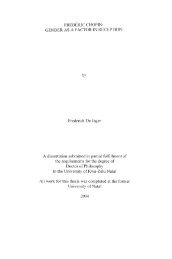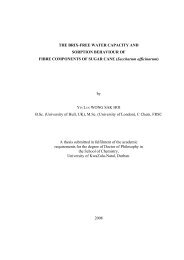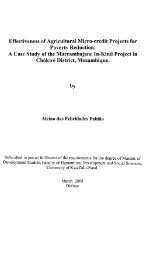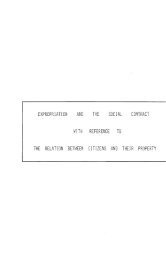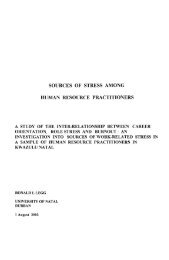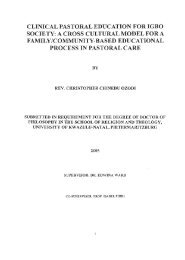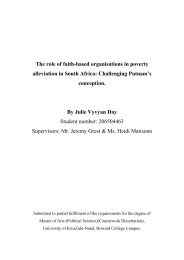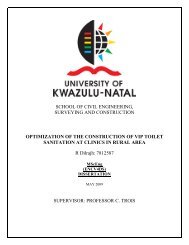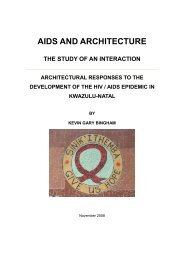View/Open - ResearchSpace - University of KwaZulu-Natal
View/Open - ResearchSpace - University of KwaZulu-Natal
View/Open - ResearchSpace - University of KwaZulu-Natal
You also want an ePaper? Increase the reach of your titles
YUMPU automatically turns print PDFs into web optimized ePapers that Google loves.
other group members to remember details that may have been forgotten (Catterall &<br />
Maclaran, 1997; Kitzinger, 1994).<br />
In this study, collecting data from focus groups with volunteer caregivers proved useful in<br />
providing insight into how the concept <strong>of</strong> infection control practices among volunteer<br />
caregivers is carried out and understood. Focus group discussions were conducted in IsiZulu<br />
and facilitated by an isiZulu speaking facilitator who was also a member <strong>of</strong> the research team.<br />
The focus group discussions were conducted in IsiZulu inorder to allow the participants to<br />
express themselves which also helped in gaining more insight to the study. The researcher<br />
was an observer and took notes. These focus group discussions were guided by a focus group<br />
guide with open-ended questions (see appendix 3). The major themes covered were:<br />
perceptions <strong>of</strong> infection control practice by volunteer caregivers; resources available for<br />
infection control practices in HBCOs; how volunteer caregivers carried out infection control<br />
practices in HBCOs; challenges that they faced regarding infection control practices and the<br />
strategies developed to deal with any challenges. These focus group discussions lasted for<br />
approximately 40 to 80 minutes and they were recorded using an audio recorder and later<br />
transcribes into English.<br />
3.5.3 The role <strong>of</strong> a researcher and facilitator<br />
This research is an interpretive study that relies on the ideas and interpretations <strong>of</strong> the<br />
researcher, this means that the researcher needs to be aware and critically reflexive <strong>of</strong> his/her<br />
own role and influence in the process and constructed understandings (Terre Blanche et al,<br />
2006). For the purposes <strong>of</strong> this study, the term facilitator will be used. The researcher in this<br />
study was not a Zulu speaker and was therefore unable to facilitate focus group discussions<br />
and thus performed a role <strong>of</strong> observation, note taking and recording <strong>of</strong> the findings by means<br />
<strong>of</strong> a tape recorder. A facilitator who was a Zulu speaker and also a member <strong>of</strong> the research<br />
team facilitated the focus group discussions because he understood the literature on HBC,<br />
research objectives and questions <strong>of</strong> the research study. The role <strong>of</strong> the facilitors was to<br />
“create a non-threatening supportive climate that encourages all participants to share views;<br />
facilitating interaction among members; interjecting probing comments, transitional questions<br />
and summaries without interfering too abruptly with the dialogue; covering important topics<br />
35



